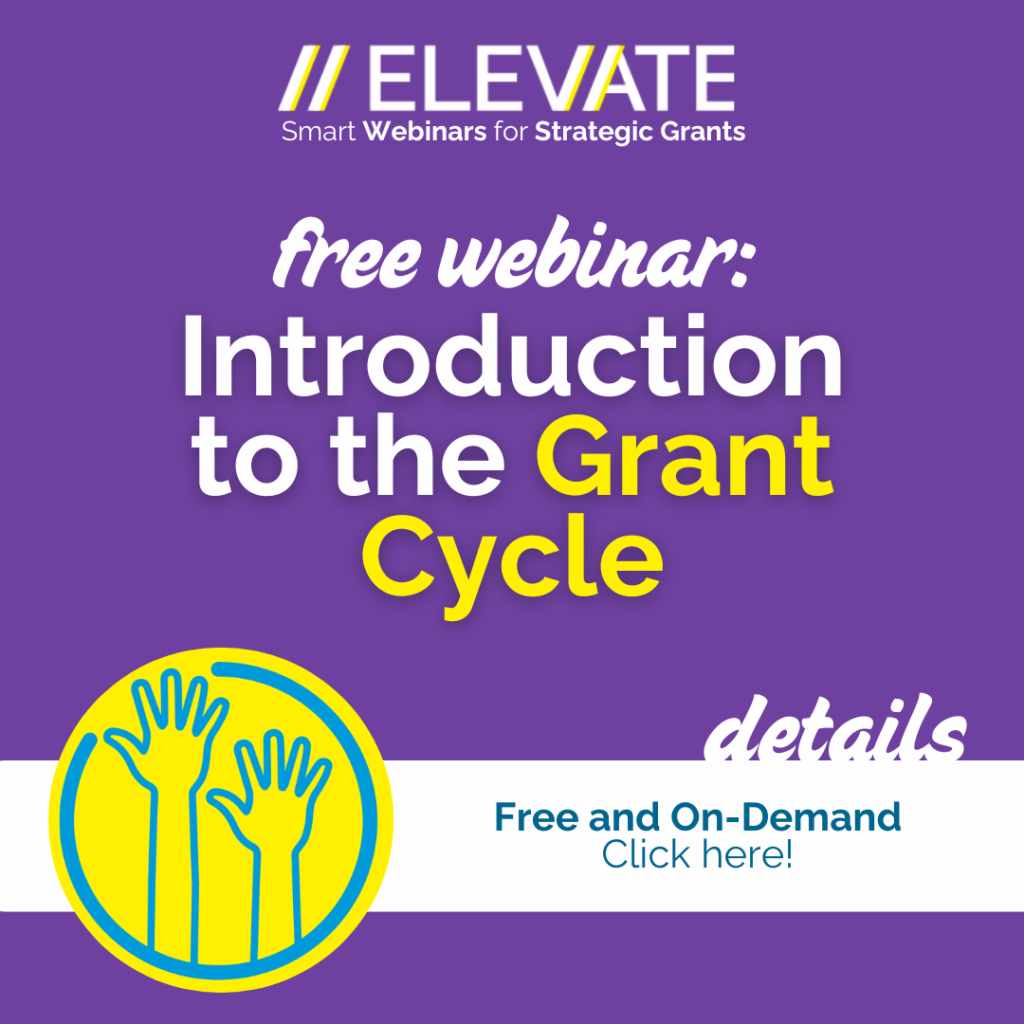March 18, 2020
As your partners in fundraising, Elevate staff know all too well the importance of the work you do as nonprofit professionals.
We also know the need for your work does not pause — and in fact, may increase — in times of crisis or global concern.
Securing funding for your work is arguably more urgent and important than ever during periods of uncertainty, though we realize the way forward may feel unclear. As such, we’ve put together our best advice for continuing to fundraise effectively, even when ‘normalcy’ has been disrupted:
Assume grantmakers are continuing to operate unless you hear otherwise.
So far, we’ve seen a few deadlines shift, but not many. We recommend monitoring funders, updates, and deadlines closely, with a presumption that they’re still accepting and awarding grants.
Monitor emerging “rapid response” opportunities that FALL OUTSIDE standard grantmaking timelines or processes.
For example, the Greater Washington Community Foundation is working alongside the DC region’s largest philanthropists to establish an emergency fund and distribute rapid response funding to the organizations meeting the needs of communities most impacted by this virus — families who have lost needed childcare, low-wage, hourly workers, people experiencing homelessness, direct service workers, and senior citizens or people with underlying health conditions.
Get a clear picture of your finances.
Our colleagues at Your Part-Time Controller and 20 Degrees both highlight the importance of understanding the short- and long-term impact of COVID-19 on your “financial runway.” Ask your finance staff or consultants for more frequent financial reports, updated modeling for various contingencies, and even advice revising your annual organizational and program budgets. If you’re using our guidance on predicting grant revenue, consider adjusting your grant projections to reflect reduced likelihood of funding from prospective grantmakers to better understand how this will impact your grant revenue.
Tell your nonprofit’s COVID-19 story to your most loyal supporters.
The experts at Chronicle for Philanthropy note that global crises that affect all members of society can motivate significant philanthropic giving. However, the people motivated to give often don’t know where their giving will have the most impact. Clarify for your staunchest donors how COVID-19 is impacting your organization, staff, and stakeholders so that they know the value of their past and future contributions.
Take stock of your community’s needs and your response and align your outreach to funders accordingly.
While all organizations should remain in contact with your key philanthropic stakeholders, your approach should be tailored to the larger community context:
- If you are expanding your services to address the community needs due to COVID-19, you can reach out to your long-term funders about these emerging and how they can help. First, review whether they have launched any specific funds so you can request support through those channels. If they have not created any designated funds, consider reaching out to your primary point of contact directly about the increased need you anticipate, how you are responding, and how a one-time gift might help.
- If your services are not expanding, avoid soliciting new funding. As our society comes together around this issue, it’s important to acknowledge that new giving will be directed toward the causes that are most in need of support right now. However, you can request other types of support during an uncertain time from current funders, even if your services remain unchanged. Many grantmakers may be open to requests to extend report or proposal deadlines, adjust how or when a grant is paid out, transition restricted funding to unrestricted funding, or even convert an event sponsorship or ticket purchase to a simple donation that can help ensure sustainability for your organization.
Find creative alternatives to building and sustaining donor relationships.
We’ve seen remarkable ingenuity around the country regarding donor engagement that has historically happened face-to-face. Organizations are converting in-person fundraising events to virtual celebrations, holding performances via Facebook Live, or even phone banking to thank organizational supporters for their past gifts. Remember that the important part of any fundraising event is to connect with your donors and you do not necessarily need a venue or catering to do that.
Finally, times of uncertainty like this remind us that a diversified fundraising strategy is a pillar of organizational sustainability. Elevate has consistently found grant programs to be more stable than other forms of revenue in times of sudden change or economic downturn. We’re seeing foundations step up to fill some of the voids that appear from canceled events or individual donors who may be less able to give in an unstable market.
We’re Here to Help!
Elevate is committed to being a resource for nonprofits at this time.
- Click here to register for one of three free grantwriting webinars we offer on a rotating basis!
- Check back for future blog posts in the coming weeks and months, on planning for the longer-term economic ramifications of COVID-19 so your organization is prepared for the “new normal”.
- If your organization needs extra grants capacity for any reason, reach out to us via our Hire Us form, for our comprehensive grant writing support or our short-term writing capacity support.
- If you are a current client, please reach out to your team Director for support revising your annual grant projections, developing messaging for current funders, rearranging soft or rolling deadlines on your grant calendar, or strategizing emergency funding requests.
Additional Resources for nonprofits:
About the Author:

President & Managing Director

















